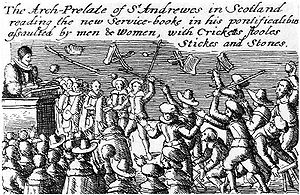Scotland in the Wars of the Three Kingdoms
| Scotland in the Wars of the Three Kingdoms | ||||||||
|---|---|---|---|---|---|---|---|---|
| Part of the Wars of the Three Kingdoms | ||||||||
 The start. Riot sparked by Jenny Geddes over the imposition of Charles I's Book of Common Prayer in Presbyterian Scotland. Civil disobedience soon turned into armed defiance. |
||||||||
|
||||||||
| Belligerents | ||||||||
|
|
|
English Roundheads | ||||||
| Commanders and leaders | ||||||||
|
|
||||||||
| Strength | ||||||||
| Fluctuating, 2 000–4 000 troops at any one time | over 30,000 troops, but many based in England and Ireland | |||||||
| Casualties and losses | ||||||||
| Total of 28,000 battlefield deaths on both sides, more soldiers die from disease, c. 45,000 civilian deaths, both from disease and deliberate targeting | ||||||||
Between 1639 and 1653 Scotland was involved in the Wars of the Three Kingdoms, a series of wars starting with the Bishops Wars (between Scotland and England) the Irish Rebellion of 1641, the English Civil War (and closely related war in Scotland), the Irish Confederate Wars and finally the subjugation of Ireland and Scotland by the English Roundhead New Model Army.
In Scotland itself, from 1644–1645 a Scottish civil war was fought between Scottish Royalists—supporters of Charles I under James Graham, 1st Marquis of Montrose—and the Covenanters, who had controlled Scotland since 1639 and allied with the English Parliament. The Scottish Royalists, aided by Irish troops, had a rapid series of victories in 1644–45, but were eventually defeated by the Covenanters.
However, the Covenanters then found themselves at odds with the English Parliament, so crowned Charles II at Scone and thus stated their intention to place him on the thrones of England and Ireland as well. This led to the Third English Civil War, when Scotland was invaded and occupied by the Parliamentarian New Model Army under Oliver Cromwell.
Scotland had helped to spark this series of wars in 1638, when it had risen in revolt against Charles I's religious policies. The National Covenant of Scotland was formulated to resist the King's innovations, particularly the Prayer Book. In practice, the Covenant also expressed a wider Scottish dissatisfaction with Charles's policies, especially the sidelining of Scotland since the Stuart Kings had also become monarchs of England in 1603. The Covenanters raised a large army from the dependants of their landed class and successfully resisted Charles I's attempt to impose his will on Scotland in the so-called Bishops Wars.
...
Wikipedia
